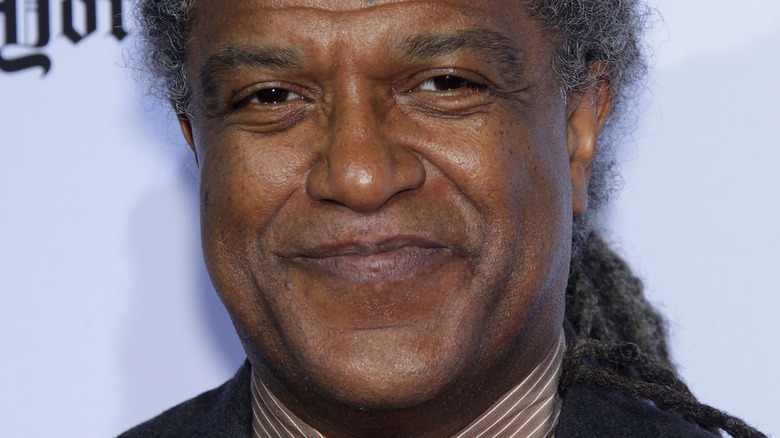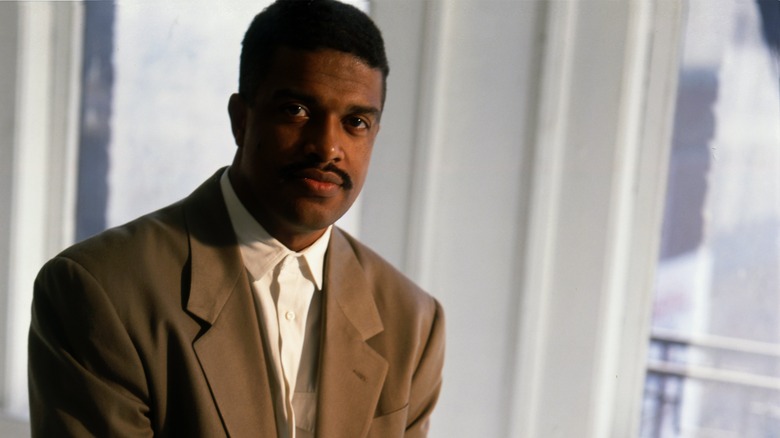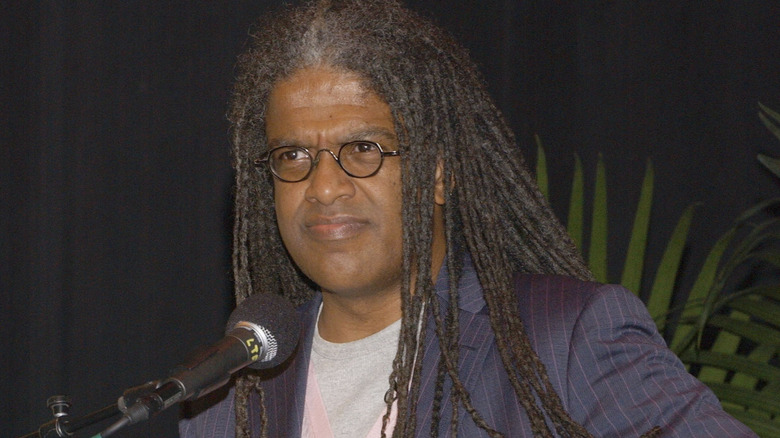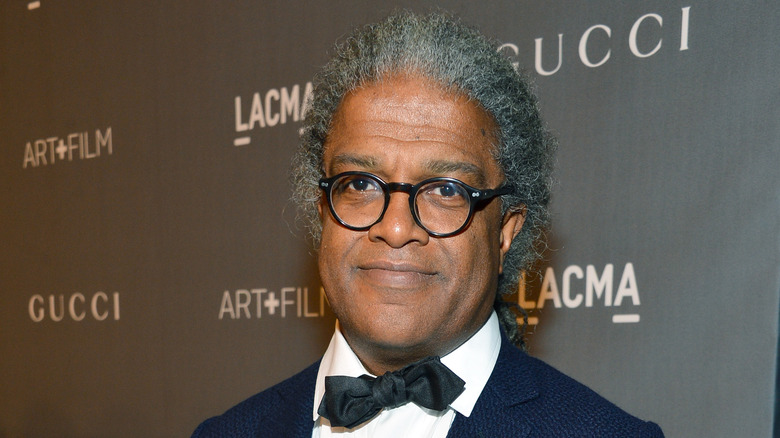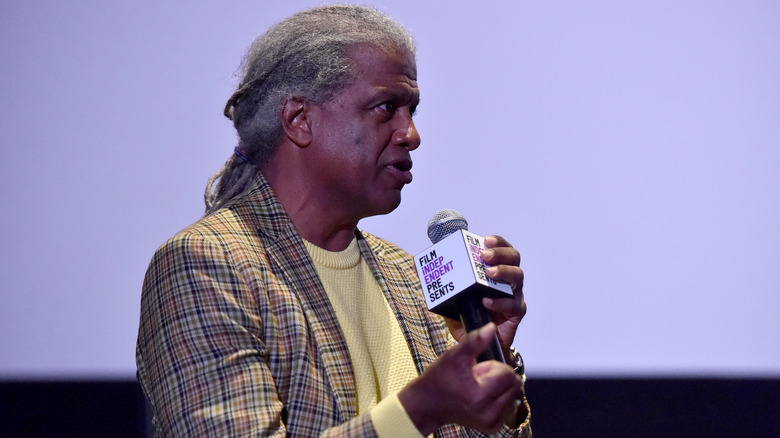The Truth About Elvis Mitchell
Elvis Mitchell is a man of many talents. Known to many as a film critic, Mitchell is a true multi-hyphenate, making contributions to pop culture as an interviewer, programmer, and producer. Fans flock to his show, "The Treatment," to listen to Mitchell's opinions on happenings in the pop culture and entertainment world (per KCRW).
As a film critic, Mitchell has worked at some of the country's most renowned publications, including LA Weekly, The New York Times, and the Detroit Free Press (per WDET). Before beginning such a powerful and noteworthy career, he was just a kid from Detroit.
Mitchell was born in Detroit on December 6, 1958, and grew up in Highland Park in a family with eight siblings. His father was a hard worker, putting in hours and hours at two jobs. By day, he was a dairy plant employee who went on to work at an industrial laundry facility at night. His mother was a homemaker (per Encyclopedia.com). "He could be on his feet lifting and hauling heavy boxes or heaving large piles of sopping-wet tablecloths and uniforms for up to 16 hours, a feat he sometimes pulled off five days a week until he opted to take his retirement," Mitchell wrote of his father in a piece for The New York Times.
Elvis understood the value of hard work from a young age
Elvis Mitchell stayed in the Detroit metro area through his college career. He graduated from Wayne State University in 1980 with an English degree and began his career in film criticism soon thereafter — amidst one of the great eras in film, as technology was advancing but classic elements of a pre-digital era remained.
Mitchell got his first job at The Oakland Press in Pontiac, covering TV (per The New York Times). He recalls a conversation he had with his father at that time where they compared days. While Mitchell's day had started that morning, his father's had started two days prior — and he'd been going ever since. "At the end of this story, I realized that my 62-year-old father had been up and on his feet working for 48 hours, and had walked a mile and a half in the snow a couple of times. He looked at me and said, 'What did you do?'" he wrote.
"I had sat in a warm room where I'd eaten sandwiches and watched TV. 'Um, nothing,' I said, standing to leave. 'Nothing at all.' The lessons I learned from him are that there are no bad jobs, and that hard work never killed anybody, though it might make you wish you were dead."
Elvis developed a voice that stitches together references beautifully
Elvis Mitchell made a friend who changed the trajectory of his life. He befriended New Yorker film critic Pauline Kael, who, after talking with him for just a short while, tried to get him in at the Detroit Free Press with a letter (per Encyclopedia.com). He expanded on the relationship in the 2007 documentary "For the Love of Movies: The Story of American Film Criticism." While Mitchell failed to land the job with the Free Press (this first time), despite Kael's recommendation, it marked the start of his career as a film critic.
He moved to Los Angeles, then returned to Detroit in 1987 — to work at the Free Press — before deciding to go freelance. He shared his nuanced take on some of the popular films of the day, building a fan base for the way he weaved different elements of pop culture together. He also stood out as a unique voice as one of few Black film critics of the time.
It was in the mid-1990s that Mitchell began working with National Public Radio as a commentator on "Weekend Edition" (per RogerEbert.com). This opened the door for "The Treatment," his own pop culture commentary show that now has over 20 years under its belt (per IMDb).
Elvis wrote for The New York Times, but it never felt quite right
It was 1999 when The New York Times offered Elvis Mitchell a place among their ranks (per Encyclopedia.com). Film fans were captivated by the parallels among different areas of pop culture that Mitchell seamlessly drew.
During his time there, he used the platform to also integrate some social commentary into his reviews. He shared the occasion where at a film festival, the Toronto International Film Festival in 2001, he was mistaken for the suspect of a crime that had occurred nearby.
"After the final press conference, a group of us stood outside talking about the feelings evoked in the last few days. The accommodating nature of Torontonians had gone a long way toward alleviating discomfort," he wrote in the review. "And then I looked up to find myself surrounded by four police officers, two standing on a concrete abutment behind me with their hands resting near their guns."
Elvis got into different kinds of projects in the next phase of his career
Elvis Mitchell left The New York Times in spring 2004 when he was passed over for a promotion to chief film critic after five years with the paper.
"I just never thought I was a Times kind of writer. And I think my being there, I hope it opened doors and changed some people's perceptions," he noted in a March 2007 interview with Undercover Black Man. "Because I know after I got there, whenever I got asked to do a speaking engagement, especially at a high school or something, I always went because I thought kids should see my example and see that if I can do this, they can do it, too."
Mitchell went on to guest lecture at Harvard (per The Harvard Crimson). In 2005, he signed on with Columbia Pictures as an executive production consultant on "The Black List," a documentary that saw him interview 22 African American leaders across different areas of life, from Susan Rice to Sean "P. Diddy" Combs, about their experiences (per IMDb). There have since been another two volumes, in 2009 and 2010.
Elvis has taken his work in many different directions
Elvis Mitchell jumped around quite a bit in the following years. In addition to his other projects, Elvis became the curator of the Film Independent program at the Los Angeles County Museum of Art in 2011. The next year, he accepted the position of film scholar at the Department of Film at the University of Nevada, Las Vegas (per KCRW). In 2016, Mitchell premiered "Elvis Goes There," an EPIX four-part docuseries that took interviews with filmmakers to their most familiar haunts (per RogerEbert.com).
He pays attention to the ways the industry has changed. "Film criticism is now everywhere. It's become democratized so that, for good or ill, everyone thinks that they can be a film critic, the same way that everyone thinks they can now be a filmmaker because they can shoot with their smartphones," he noted. "'There's also not this line that used to basically say, "You have to be a white person to be [a] filmmaker.' So some of those walls, those barriers have been sundered, and that's a good thing."
Mitchell will be among interviewers at the 93rd Oscars on April 25 (per People).
